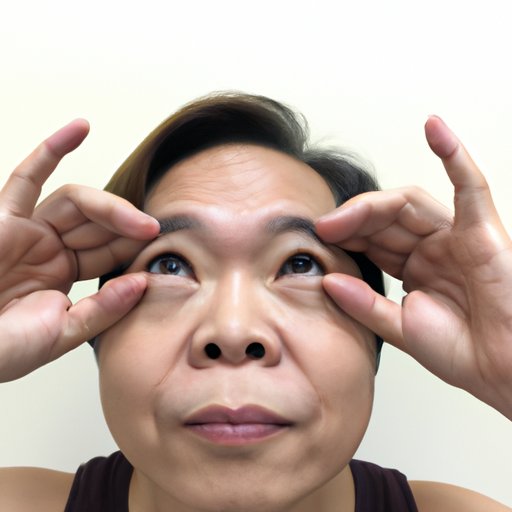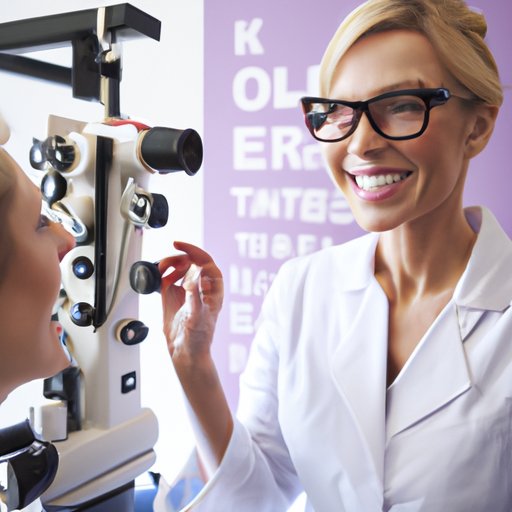Introduction
Eye health is essential for a person’s overall wellbeing. According to the World Health Organization (WHO), approximately 2.2 billion people worldwide suffer from vision impairment or blindness. Poor eye health can lead to vision problems and even permanent vision loss. Fortunately, there are several steps that everyone can take to maintain good eye health and prevent vision-related issues. In this article, we will explore five ways to improve eye health.
Wear Sunglasses Regularly to Protect from UV Rays
The sun emits ultraviolet (UV) rays that can cause damage to the eyes. Prolonged exposure to UV radiation has been linked to certain eye conditions such as cataracts and macular degeneration. Therefore, it is important to protect the eyes from UV rays. Wearing sunglasses is one of the best ways to do this.
Dangers of UV Rays
UV rays are invisible and cannot be felt, but they can still cause harm to the eyes. According to the American Optometric Association, “exposure to UV light may increase the risk of developing certain eye conditions such as cataracts, macular degeneration, and pingueculae”. UV rays can also cause short-term damage such as photokeratitis, which is a form of temporary sunburn of the cornea.
Types of Sun Protection
When choosing sunglasses, look for lenses that block both UVA and UVB rays. The American Academy of Ophthalmology recommends sunglasses that have at least 98% UVA and UVB protection. In addition, polarized lenses can help reduce glare and make it easier to see objects in bright sunlight.
Benefits of Wearing Sunglasses
In addition to providing protection from UV rays, wearing sunglasses can also reduce the risk of developing eye diseases. According to a study published in the British Journal of Ophthalmology, “long-term use of sunglasses was associated with a reduced risk of cataract formation”. Wearing sunglasses can also reduce the risk of developing age-related macular degeneration.
Eat a Balanced Diet Rich in Vitamins and Minerals
Eating a balanced diet is essential for maintaining good eye health. Certain vitamins and minerals can help protect against age-related eye diseases and keep the eyes healthy.
Nutrients Important for Eye Health
According to the American Academy of Ophthalmology, the following nutrients are important for eye health: vitamin A, vitamin C, vitamin E, zinc, lutein, zeaxanthin, and omega-3 fatty acids. Vitamin A helps protect against night blindness, while vitamin C and E can help reduce the risk of cataracts and macular degeneration. Zinc is important for the development and maintenance of healthy retina cells, while lutein and zeaxanthin help protect against age-related macular degeneration. Omega-3 fatty acids can also help reduce the risk of developing dry eye syndrome.
Foods High in Nutrients
Some foods that are high in these nutrients include carrots, spinach, kale, salmon, tuna, eggs, nuts, and seeds. Other sources include oranges, bell peppers, papaya, sweet potatoes, and avocados. Eating a variety of fruits and vegetables each day is a great way to ensure that you are getting enough of these important nutrients.
Benefits of Eating a Balanced Diet
Eating a diet rich in vitamins and minerals can help reduce the risk of eye diseases and keep the eyes healthy. According to a study published in JAMA Ophthalmology, “higher dietary intake of certain antioxidants and other nutrients was associated with a lower risk of cataract”. Eating a balanced diet can also help reduce the risk of developing age-related macular degeneration.

Perform Eye Exercises to Improve Vision
Eye exercises can help improve vision and strengthen the muscles of the eyes. Performing eye exercises regularly can help reduce eye strain and fatigue.
Examples of Eye Exercises
Some examples of eye exercises include palming, focusing, and blinking. Palming involves covering the eyes with the palms of the hands for several minutes. Focusing involves looking at an object and then shifting focus to another object. Blinking involves closing and opening the eyes rapidly for a few seconds.
Benefits of Eye Exercises
Regularly performing eye exercises can help improve vision and reduce eye strain and fatigue. According to a study published in the journal BMC Ophthalmology, “eye exercises can improve visual acuity, contrast sensitivity, and dynamic visual performance”. Eye exercises can also help reduce the symptoms of computer vision syndrome, which is caused by prolonged use of digital devices.

Take Breaks from Looking at Digital Screens
Prolonged use of digital devices such as computers, smartphones, and tablets can lead to eye strain, headaches, and blurred vision. Taking regular breaks from looking at digital screens can help reduce these symptoms.
Effects of Prolonged Screen Time
Prolonged use of digital devices can cause eye strain and other vision-related problems. According to the American Optometric Association, “prolonged use of digital devices can lead to a condition known as Computer Vision Syndrome (CVS)”. Symptoms of CVS include eye strain, headaches, blurred vision, and dry eyes.
Strategies for Taking Breaks
Taking regular breaks from looking at digital screens is important for preventing eye strain and other vision-related problems. The American Optometric Association recommends taking a 20-second break every 20 minutes. During these breaks, it is important to look away from the screen and focus on something else. Additionally, it is important to get enough sleep at night to give the eyes a chance to rest.

Visit an Eye Care Professional for Regular Checkups
Visiting an eye care professional for regular checkups is important for maintaining good eye health. An eye exam can help detect any problems early, before they become more serious.
Importance of Seeing an Eye Care Professional
It is important to see an eye care professional for regular checkups, even if you don’t have any vision problems. During an eye exam, the eye doctor can check for any signs of eye diseases or conditions such as glaucoma, cataracts, and macular degeneration. Early detection of these conditions can help prevent vision loss.
Types of Tests Performed
During an eye exam, the eye doctor will perform a series of tests to check your vision and eye health. These tests may include a visual acuity test, a refraction test, a dilated eye exam, and a glaucoma test. The eye doctor may also use special instruments to examine the eyes more closely.
Benefits of Regular Eye Exams
Regular eye exams can help detect any eye problems early, before they become more serious. According to the American Optometric Association, “early detection and treatment of eye and vision problems can help prevent vision loss”. Eye exams can also help identify any underlying medical conditions that may be causing vision problems.
Conclusion
Good eye health is essential for a person’s overall wellbeing. There are several steps that everyone can take to maintain good eye health and prevent vision-related issues. This includes wearing sunglasses to protect from UV rays, eating a balanced diet rich in vitamins and minerals, performing eye exercises, taking breaks from looking at digital screens, and visiting an eye care professional for regular checkups. Implementing these practices can help protect your eyes and preserve your vision for years to come.
(Note: Is this article not meeting your expectations? Do you have knowledge or insights to share? Unlock new opportunities and expand your reach by joining our authors team. Click Registration to join us and share your expertise with our readers.)
